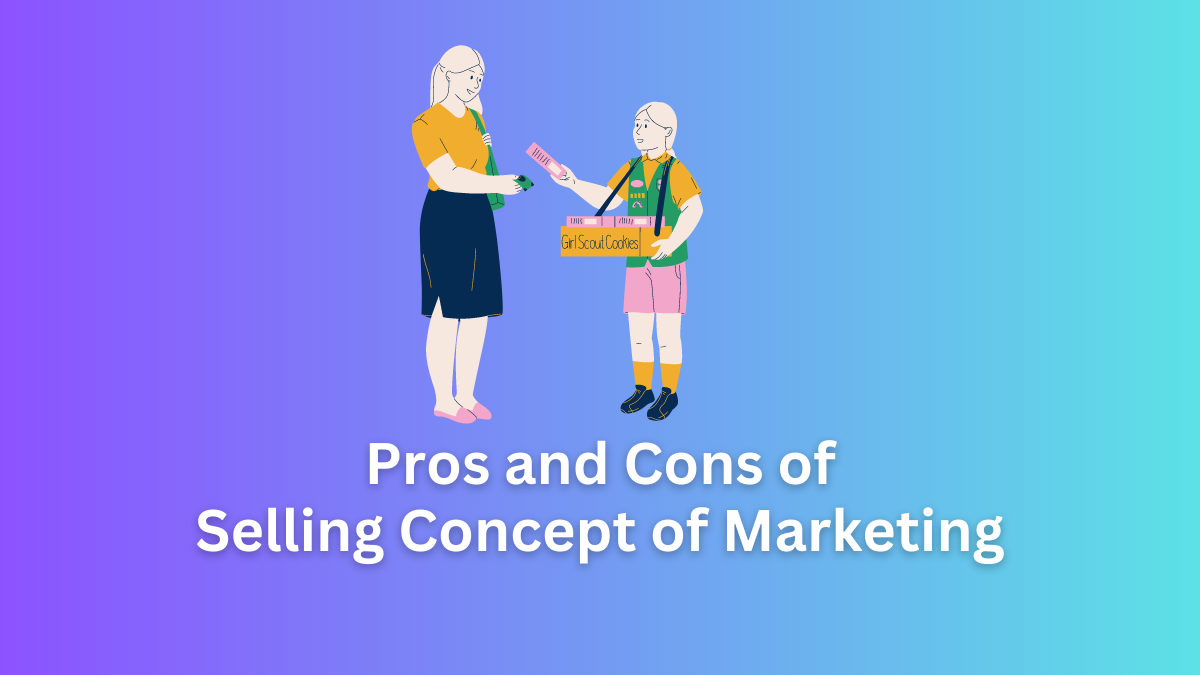Pros and Cons of Selling Concept
The selling concept of marketing refers to the marketing philosophy that believes that unless you aggressively promote your products and persuade consumers to buy your products they usually do not buy. It explains consumers need to be influenced to make them buy your products.
Let’s look at some notable pros and cons of selling concept of marketing.
Pros of Selling Concept
The selling concept of marketing aims to increase the sales volume of the company as far as possible. Let’s further explore how selling marketing concept helps companies to achieve their sales goals:
Increased Sales Volume
The selling concept places a strong emphasis on aggressive promotion and sales efforts. This often leads to a surge in sales transactions as customers are actively persuaded to make purchases they might not have considered otherwise.
Also Read: Types of Consumer Needs
Clear Focus on Sales
With the selling concept, the primary objective is crystal clear – to sell products. This focused approach can help companies streamline their efforts and resources toward achieving higher sales targets.
Liquidating Inventory
Particularly beneficial for products with excess inventory, the selling concept aids in efficiently clearing stock. Companies can strategically employ tactics to sell off surplus goods, preventing stockpile-related challenges.
Related: 8 Pros and 7 Cons of Production Concept of Marketing
Market Share Growth
Aggressive selling often results in the expansion of market share. By employing effective sales tactics, a company can outshine competitors and capture a larger portion of the market, solidifying its position.
Increased Brand Awareness
The persistent promotional efforts of the selling concept result in increased visibility of the product or service. This heightened brand presence can lead to word-of-mouth referrals and organic growth in the customer base.
Quick Revenue Generation
The focus on immediate sales transactions can lead to faster revenue generation. For products that don’t necessarily require lengthy decision-making processes, the selling concept can yield rapid financial returns.
Read Also: The Production Concept of Marketing
Effective for Unsought Products
This approach shines when dealing with products that customers might not actively seek out, such as insurance or luxury items. By aggressively presenting the benefits, these products can be successfully marketed.
Adaptable Advertising Strategies
The selling concept encourages companies to tailor advertising strategies to their needs. For instance, seasonal products can be promoted at specific times to maximize sales during peak demand periods.
Cons of Selling Concept
While the selling concept may effective to increase sales volume, it also comes with some drawbacks. Let’s look at some disadvantages of the selling concept:
Related: Product Concept of Marketing
Neglecting Customer Needs
One of the core downsides of the selling concept is its tendency to overlook the genuine needs and desires of customers. Instead of aligning products with what customers truly want, the focus is on pushing what the company produces. This can lead to dissatisfaction among buyers who feel that their preferences are being ignored.
Short-Term Focus
The selling concept places a strong emphasis on immediate sales transactions, often disregarding the importance of nurturing long-term customer relationships. Building customer loyalty and encouraging repeat purchases are essential for sustained business growth, which the selling concept fails to address adequately.
Misguided Assumption
An underlying assumption of the selling concept is that aggressive selling can overcome any potential dissatisfaction with the product. However, dissatisfied customers are more likely to share their negative experiences, which can spoil the brand’s reputation and undermine the effectiveness of aggressive sales tactics.
Limited Applicability
While effective for unsought products like insurance or luxury items, the selling concept isn’t universally applicable. For products that require a deeper understanding of customer needs and preferences, the approach falls short. Modern marketing often revolves around addressing customer pain points and offering solutions, which the selling concept doesn’t inherently prioritize.
Read Also: The 4 Cs of Marketing:
Undermining Customer Satisfaction
By focusing solely on pushing products, the selling concept risks creating a transactional relationship with customers. This can lead to customers feeling undervalued and unsatisfied, as their needs and preferences take a backseat to the company’s desire to make a sale.
Lack of Differentiation
The selling concept may lead to a lack of product differentiation. When the emphasis is on aggressive selling and promotion, products might appear similar to competitors’ offerings. This can lead to a race to the bottom in terms of pricing, eroding profitability, and market positioning.
Negative Customer Perception
The persistent use of aggressive sales tactics, especially when customers are not genuinely interested, can lead to annoyance and negative perception. Instead of building positive relationships, the company might accidentally distance potential customers.
Read Next: Pros and Cons of Product Concept
Arti Kushmi holds a BBS (Bachelor in Business Studies) degree and shares her business and marketing knowledge through this website. While not writing she will be reading and enjoying the moment.
